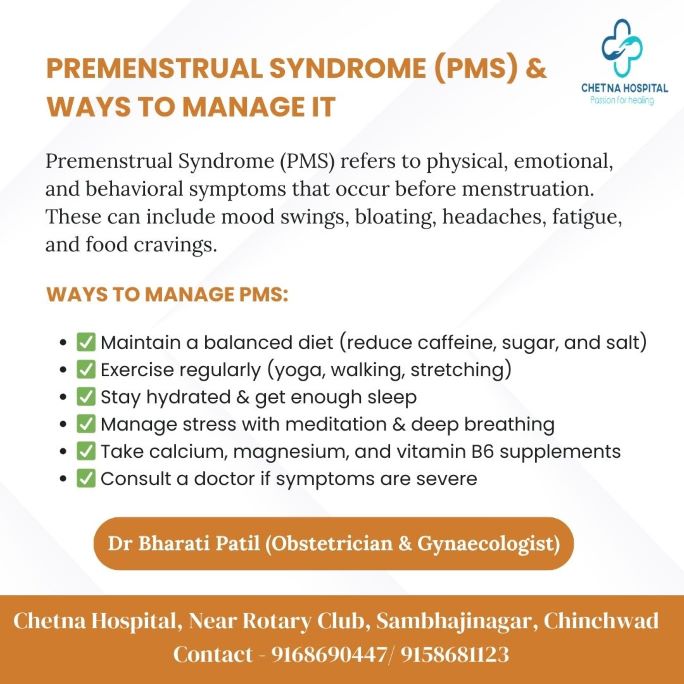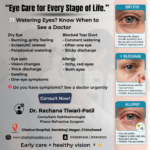Premenstrual Syndrome (PMS) is a condition that affects many women in the days or even weeks leading up to their period. It is characterized by a variety of symptoms, both physical and emotional, that can interfere with daily life. While PMS is a common issue, the good news is that there are many ways to manage it, reducing its impact and helping women feel better during this challenging time.
What is PMS?
Premenstrual Syndrome is a collection of symptoms that typically occur in the second half of a woman’s menstrual cycle, after ovulation and before the start of her period. The exact cause of PMS is still unclear, but it is believed to be related to hormonal fluctuations, specifically changes in estrogen and progesterone levels, as well as serotonin (the “feel-good” hormone) levels.
PMS affects about 75% of women during their reproductive years, with symptoms ranging from mild to severe. The most common symptoms include:
- Emotional Symptoms: Irritability, mood swings, anxiety, depression, and fatigue.
- Physical Symptoms: Bloating, breast tenderness, headaches, acne flare-ups, muscle or joint pain, and digestive issues.
- Behavioral Symptoms: Changes in appetite, cravings, sleep disturbances, and trouble concentrating.
While PMS is a normal part of the menstrual cycle, it can be disruptive to daily activities. Understanding the causes and symptoms of PMS is the first step in finding effective ways to manage and alleviate its effects.
How to Manage PMS
Managing PMS involves a combination of lifestyle changes, dietary adjustments, stress management, and sometimes, medical treatment. Here are several strategies to help reduce the severity of PMS symptoms:
1. Regular Exercise
Exercise is one of the most effective natural remedies for managing PMS. Physical activity helps release endorphins, the body’s natural mood boosters, which can counteract irritability and mood swings. Regular exercise can also improve circulation, reduce bloating, alleviate fatigue, and enhance sleep quality.
- Aerobic exercise such as walking, running, or cycling is particularly beneficial for reducing stress and promoting overall well-being.
- Strength training can help improve muscle tone and reduce physical discomfort like joint or back pain.
- Yoga and stretching can also be effective for relieving muscle tension and calming the mind.
Even light activity such as walking for 20-30 minutes a day can make a significant difference in reducing PMS symptoms.
2. Eat a Balanced Diet
What you eat plays a crucial role in managing PMS. Certain foods can help alleviate symptoms, while others can exacerbate them. Focus on consuming a balanced, nutrient-rich diet that includes:
- Whole grains: Foods like brown rice, oats, and quinoa provide steady energy and stabilize blood sugar levels.
- Lean proteins: Incorporating sources of lean protein, such as chicken, turkey, tofu, and legumes, can help balance hormone levels and reduce cravings.
- Fruits and vegetables: These provide essential vitamins, minerals, and fiber, which support overall health and reduce bloating.
- Healthy fats: Omega-3 fatty acids found in foods like salmon, walnuts, and flaxseeds can help reduce inflammation and improve mood.
On the flip side, try to limit or avoid the following:
- Salty foods: Excess salt can cause water retention and worsen bloating.
- Caffeine: Caffeine can increase anxiety and disrupt sleep, which can exacerbate PMS symptoms.
- Sugary foods: While cravings for sweets may be common during PMS, consuming too much sugar can lead to mood swings and energy crashes.
Eating smaller, balanced meals throughout the day can help maintain steady blood sugar levels and reduce cravings, fatigue, and irritability.
3. Stay Hydrated
Drinking plenty of water can help reduce bloating, improve digestion, and prevent headaches. Hydration is particularly important during PMS, as many women experience water retention, which can make symptoms worse.
If you’re prone to bloating, try drinking herbal teas such as ginger or peppermint, which can aid digestion and reduce discomfort. Avoiding caffeinated or alcoholic beverages, which can dehydrate the body, is also a good idea during this time.
4. Manage Stress Effectively
PMS symptoms can be intensified by stress. Finding effective ways to relax and de-stress is essential in managing the emotional and physical effects of PMS. Here are some stress-reducing techniques:
- Mindfulness and Meditation: Practicing mindfulness and meditation can help calm the mind and reduce anxiety and irritability. Apps like Headspace or Calm provide guided meditation sessions that can be easily incorporated into your daily routine.
- Deep Breathing Exercises: Deep breathing exercises, like the 4-7-8 technique, can help activate the body’s relaxation response, lowering stress levels.
- Progressive Muscle Relaxation: This technique involves tensing and relaxing different muscle groups to relieve tension in the body and promote relaxation.
Incorporating stress management practices like these into your daily routine can greatly improve your mood and well-being during PMS.
5. Ensure Adequate Sleep
Sleep disturbances are common during PMS, but adequate rest is essential for emotional and physical health. Lack of sleep can exacerbate symptoms such as irritability, fatigue, and difficulty concentrating. Aim for 7-9 hours of sleep each night to allow your body and mind to recover and restore balance.
To improve sleep quality, consider creating a relaxing bedtime routine, such as:
- Limit screen time: Avoid electronic devices like phones and computers an hour before bedtime to help signal to your brain that it’s time to wind down.
- Keep a consistent sleep schedule: Going to bed and waking up at the same time every day can regulate your sleep patterns.
- Create a comfortable sleep environment: Ensure your bedroom is cool, dark, and quiet for the best sleep quality.
6. Over-the-Counter Pain Relief
Non-prescription medications, such as ibuprofen or naproxen, can be effective in alleviating PMS-related pain, such as cramps, headaches, and back pain. These medications work by reducing inflammation and providing relief from muscle tension.
It’s important to follow the recommended dosage and consult a healthcare provider if you find that you need to take pain relievers frequently during your menstrual cycle.
7. Consider Supplements
Certain supplements may help alleviate PMS symptoms. Some commonly recommended options include:
- Calcium: Studies have shown that calcium supplementation can help reduce PMS-related mood swings, fatigue, and bloating.
- Vitamin B6: This vitamin is involved in hormone regulation and may help reduce irritability and fatigue.
- Magnesium: Magnesium can help alleviate muscle cramps and reduce water retention.
Before taking any supplements, it’s important to consult with a healthcare provider to determine the appropriate dosage and ensure they are safe for you.
When to See a Doctor
For most women, PMS is manageable with lifestyle changes and over-the-counter remedies. However, if PMS symptoms are severe, debilitating, or interfering with daily life, it may be time to consult a healthcare provider. Conditions such as Premenstrual Dysphoric Disorder (PMDD), a more severe form of PMS, may require medical intervention.
Your doctor can discuss options such as hormonal treatments, antidepressants, or other therapies to manage symptoms and improve your quality of life.
Conclusion
While PMS can be challenging, it’s important to remember that there are many ways to manage the symptoms and minimize their impact on daily life. By making lifestyle changes, focusing on self-care, and seeking expert advice when necessary, women can navigate their menstrual cycles with greater comfort and confidence.
For Consultation Contact us on 9168690447 / 9158681123
Website –
www.chetnahospital.co.in
Address – Chetna Hospital, Sambhajinagar, MIDC, G Block, Near Rotary Club, Chinchwad 411019
.
.
.
#hospital#pune#pcmc#chinchwad#health#healthcare#gynaecologist#femalegynaecologist#gynaecologistappointment#gynac#gynaecologistdoctor#gynaecologisthospital#goodgynaecologist#gynaecologistspecialist.













